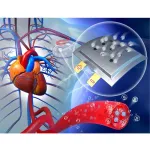(Press-News.org) People who can’t visualise an image in their mind’s eye are less likely to remember the details of important past personal events or to recognise faces, according to a review of nearly ten years of research.
People who cannot bring to mind visual imagery are also less likely to experience imagery of other kinds, like imagining music, according to new research by the academic who first discovered the phenomenon.
Professor Adam Zeman, of the University of Exeter, first coined the term aphantasia in 2015, to describe those who can’t visualise. Since then, tens of thousands of people worldwide have identified with the description. Many say they knew they processed information differently to others but were unable to describe how. Some of them expressed shock on discovering that other people can conjure up an image in their mind’s eye.
Now, Professor Zeman has conducted a review of around 50 recent studies, published in Trends in Cognitive Sciences, to summarise findings in a field that has emerged since his first publication. Research indicates that aphantasia is not a single entity but has subtypes. For example, not everyone with aphantasia has a poor autobiographical memory or difficulty in recognising faces, and in a minority of people, aphantasia appeared to be linked to autism. People who cannot visualise are more likely to have scientific occupations. Unexpectedly, although people with aphantasia can’t visualise at will, they often dream visually.
Professor Zeman’s review provides evidence that whether people have aphantasia or hyperphantasia – a particularly vivid visual imagination – is linked to variations in their physiology and neural connectivity in the brain, as well as in behaviour. For example, listening to scary stories alters skin conductance in those with imagery, meaning people sweat – but this does not occur in people with aphantasia.
Aphantasia is thought to affect around one per cent of the population, while three per cent are hyperphantasic. These figures rise to around five and 10 per cent with more generous criteria for inclusion. Both aphantasia and hyperphantasia often run in families, hinting at the possibility of a genetic basis.
Professor Zeman, who now holds honorary contracts at the universities of Exeter and Edinburgh, said: “Coining the term ‘aphantasia’ has unexpectedly opened a window on a neglected aspect of human experience. It is very gratifying that people who lack imagery have found the term helpful, while a substantial surge of research is shedding light on the implications of aphantasia.
“Despite the profound contrast in subjective experience between aphantasia and hyperphantasia, effects on everyday functioning are subtle - lack of imagery does not imply lack of imagination. Indeed, the consensus among researchers is that neither aphantasia nor hyperphantasia is a disorder. These are variations in human experience with roughly balanced advantages and disadvantages. Further work should help to spell these out in greater detail.”
The paper is entitled ‘Aphantasia and hyperphantasia – exploring imagery vividness extremes’, and is published in Trends in Cognitive Sciences.
“I struggle to fully immerse myself in role-play with my children”
Solicitor Mary Wathen’s frustration that she struggled to engage in role playing games with her two young children, when she found all other engagement with her children so fulfilling, was her sign that she had aphantasia, meaning she cannot visualise imagery.
The 43-year-old, from Newent near Cheltenham, said: “One of my friends said that he uses the images in his head to enhance role play. When I asked him to explain this in more detail it became clear that he - and everyone else in the room - could easily create an image in their head and use that as the backdrop for the role play. This was totally mind-blowing to me. I just cannot understand what they really mean - where is this image and what does it look like? To me, unless you can see something with your eyes, it’s not there.”
Mary’s shock intensified when she realised her husband, has such vivid visual imagery that he is probably hyperphantasic. “He thinks in moving pictures, like movies – sometimes to the point that he can mistake those thoughts for memories. To me, that’s unfathomable.”
Mary has come to realise that her lack of visual imagery may well account for her difficulties with memory. She said: “I can comprehend and retain concepts and principles really well but I’m unable to recall facts and figures. I can’t recreate something in my head or ‘re see’ something that is not actually there in that moment.
“I’ve found it quite saddening to learn that other people can call to mind an image of their children when they’re not there. I’d love to be able to do that, but I just can’t – but I’ve learned to compensate by taking plenty of photos, so that I can relive those memories through those images.
“Whilst I’m sure there are wonderful advantages to being able to think in pictures, I think it’s important to remind myself that there are advantages to having aphantasia too. I’m a really good written and verbal communicator – I think that’s because I’m not caught up with any pictures, so I just focus on the power of the word. I’m also a deeply emotional person and perhaps that’s my brain’s way of overcompensating; I feel things as a way of experiencing them, rather than seeing them.
“I think it’s really important to raise awareness that some people just don’t have this ability – particularly as using visual imagination is a key way that young children are taught to learn and engage. Primary teachers need to know that some children just won’t be able to visualise and that could be why they’re not engaging in those kinds of activities. We need to ensure we cater for everyone and encourage other ways of learning and engaging.”
ENDS
END
A decade of aphantasia research: what we’ve learned about people who can’t visualize
People who can’t visualize an image in their mind’s eye are less likely to remember the details of important past personal events or to recognize faces, according to a review of nearly ten years of research
2024-03-27
ELSE PRESS RELEASES FROM THIS DATE:
Implantable batteries can run on the body’s own oxygen
2024-03-27
From pacemakers to neurostimulators, implantable medical devices rely on batteries to keep the heart on beat and dampen pain. But batteries eventually run low and require invasive surgeries to replace. To address these challenges, researchers in China devised an implantable battery that runs on oxygen in the body. The study, published March 27 in the journal Chem, shows in rats that the proof-of-concept design can deliver stable power and is compatible with the biological system.
“When you think about it, oxygen is the source of our life,” says corresponding author Xizheng Liu, who specializes in energy materials and devices at Tianjin University of Technology. “If ...
Sap beetles vs wind: what pollinates screw pines?
2024-03-27
Researchers Toru Miyamoto, Ko Mochizuki, and Atsushi Kawakita of the University of Tokyo have discovered the first species pollinated by sap beetles in the genus Pandanus, a group of palm-like plants native to the tropics and subtropics of Africa and Eurasia. The discovery overturned the long-held belief that these plants were pollinated by wind. The researchers also found that fragrant screw pines’ male and female flowers produced heat at night stably, making them the first such species in the family Pandanaceae. The findings were published in ...
New trial highlights promising intervention to reduce sitting and improve blood pressure in older adults
2024-03-27
A new Kaiser Permanente study found that a health coaching intervention successfully reduced sitting time for a group of older adults by just over 30 minutes a day. Study participants also showed meaningful improvements in blood pressure, comparable to the effect of other interventions focused on physical activity.
The study was published March 27 in JAMA Network Open and included 283 Kaiser Permanente Washington members aged 60-89.
Older adults typically sit for between 65 and 80 percent of the hours that they are awake, and strong evidence shows that ...
Physical activity and incident obesity across the spectrum of genetic risk for obesity
2024-03-27
About The Study: Individuals at high genetic risk of obesity needed higher daily step counts to reduce the risk of obesity than those at moderate or low genetic risk in this study of 3,124 adults. Population-based recommendations may underestimate physical activity needed to prevent obesity among those at high genetic risk.
Authors: Evan L. Brittain, M.D., M.Sc., and Douglas M. Ruderfer, Ph.D., of the Vanderbilt University Medical Center in Nashville, are the corresponding authors.
To access the embargoed study: Visit our For The Media website at this link https://media.jamanetwork.com/
(doi:10.1001/jamanetworkopen.2024.3821)
Editor’s Note: Please ...
Researchers create new tool for assessing risk of kidney injury after chemotherapy
2024-03-27
Using patient data from six major U.S. cancer centers, Brigham researchers and collaborators developed a risk prediction model for moderate-to-severe kidney injury after receiving the chemotherapy drug cisplatin in the largest, first generalizable study of its kind
Cisplatin is a highly effective chemotherapy that has been used to treat cancer for decades, but it can cause kidney injury that can potentially lead to the discontinuation of life-saving cancer treatments. Investigators from Brigham and Women’s Hospital (BWH), a founding member of the Mass General Brigham healthcare system, with researchers from the Dana-Farber Cancer Institute and other institutions, ...
Estimated sustainable cost-based prices for diabetes medicines
2024-03-27
About The Study: High prices limit access to newer diabetes medicines in many countries. The findings of this study suggest that robust generic and biosimilar competition could reduce prices to more affordable levels and enable expansion of diabetes treatment globally.
Authors: Melissa J. Barber, Ph.D., of the Yale Collaboration for Regulatory Rigor, Integrity, and Transparency in New Haven, Connecticut, is the corresponding author.
To access the embargoed study: Visit our For The Media website at this link https://media.jamanetwork.com/
(doi:10.1001/jamanetworkopen.2024.3474)
Editor’s ...
Higher genetic risk of obesity means working out harder for same results
2024-03-27
Persons with a higher genetic risk of obesity need to work out harder than those of moderate or low genetic risk to avoid becoming obese, according to a Vanderbilt University Medical Center (VUMC) paper published in JAMA Network Open.
Study authors used activity, clinical and genetic data from the National Institutes of Health’s All of Us Research Program to explore the association of genetic risk of higher body mass index and the level of physical activity needed to reduce incident obesity.
“Physical activity guidelines do not ...
The ISSCR announces 2024 election results
2024-03-27
Evanston, IL – The International Society for Stem Cell Research (ISSCR) is pleased to announce the results of its 2024 election. Lorenz Studer, MD, founding director of the Center for Stem Cell Biology and member of the Developmental Biology Program, Memorial Sloan Kettering Cancer Center, USA, will become the next Vice President. All terms of office for the new leaders will begin on 1 July 2024.
The following three members were newly elected to the ISSCR Board of Directors for a three-year term:
Jacqueline Barry, PhD, ...
Safer, more efficient drug discovery
2024-03-27
McGill researchers have discovered a safer and more efficient technique for testing new drugs while they are in development.
“Because this approach is so much more streamlined, it could help accelerate this step in the drug development process and make it less dangerous, since probing the distribution and fate of a drug in the body is required for any pharmaceutical candidate to be approved,” says Bruce A. Arndtsen, a James McGill Professor who teaches in the Department of Chemistry at McGill and is the senior author on the paper describing the new process, published recently in Nature Chemistry.
“This research replaces what can be a days’ long, dangerous and ...
New image of the center of our Milky Way: Spiral magnetic fields surround black hole Sagittarius A*
2024-03-27
FRANKFURT. In 2022, scientists of the EHT unveiled the first image of Sgr A* – which is approximately 27,000 light-years away from Earth – revealing that the Milky Way’s supermassive black hole looks remarkably similar to M87’s, even though it is more than a thousand times smaller and less massive. This made scientists wonder whether the two shared common traits outside of their looks. To find out, the team decided to study Sgr A* in polarized light. Previous studies of light around M87* had shown that the magnetic fields around the gigantic black hole allowed it to launch powerful jets of material back into the surrounding environment. ...
LAST 30 PRESS RELEASES:
New knowledge on heritability paves the way for better treatment of people with chronic inflammatory bowel disease
Under the Lens: Microbiologists Nicola Holden and Gil Domingue weigh in on the raw milk debate
Science reveals why you can’t resist a snack – even when you’re full
Kidney cancer study finds belzutifan plus pembrolizumab post-surgery helps patients at high risk for relapse stay cancer-free longer
Alkali cation effects in electrochemical carbon dioxide reduction
Test platforms for charging wireless cars now fit on a bench
$3 million NIH grant funds national study of Medicare Advantage’s benefit expansion into social supports
Amplified Sciences achieves CAP accreditation for cutting-edge diagnostic lab
Fred Hutch announces 12 recipients of the annual Harold M. Weintraub Graduate Student Award
Native forest litter helps rebuild soil life in post-mining landscapes
Mountain soils in arid regions may emit more greenhouse gas as climate shifts, new study finds
Pairing biochar with other soil amendments could unlock stronger gains in soil health
Why do we get a skip in our step when we’re happy? Thank dopamine
UC Irvine scientists uncover cellular mechanism behind muscle repair
Platform to map living brain noninvasively takes next big step
Stress-testing the Cascadia Subduction Zone reveals variability that could impact how earthquakes spread
We may be underestimating the true carbon cost of northern wildfires
Blood test predicts which bladder cancer patients may safely skip surgery
Kennesaw State's Vijay Anand honored as National Academy of Inventors Senior Member
Recovery from whaling reveals the role of age in Humpback reproduction
Can the canny tick help prevent disease like MS and cancer?
Newcomer children show lower rates of emergency department use for non‑urgent conditions, study finds
Cognitive and neuropsychiatric function in former American football players
From trash to climate tech: rubber gloves find new life as carbon capturers materials
A step towards needed treatments for hantaviruses in new molecular map
Boys are more motivated, while girls are more compassionate?
Study identifies opposing roles for IL6 and IL6R in long-term mortality
AI accurately spots medical disorder from privacy-conscious hand images
Transient Pauli blocking for broadband ultrafast optical switching
Political polarization can spur CO2 emissions, stymie climate action
[Press-News.org] A decade of aphantasia research: what we’ve learned about people who can’t visualizePeople who can’t visualize an image in their mind’s eye are less likely to remember the details of important past personal events or to recognize faces, according to a review of nearly ten years of research






